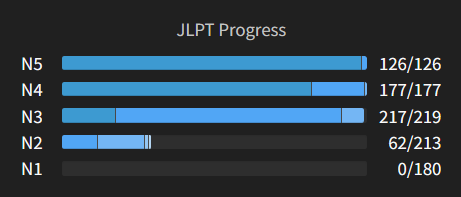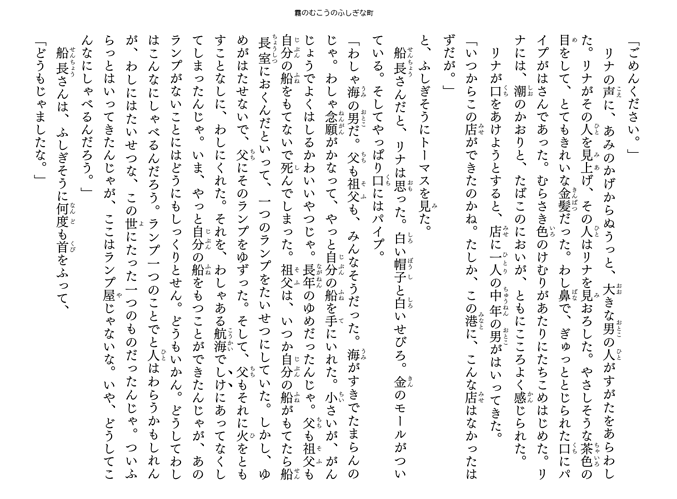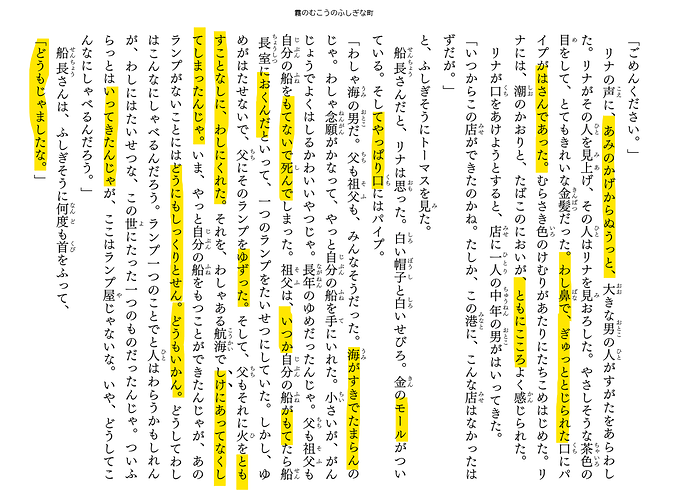An important issue I’ve consistently had in my Japanese learning is that, when reading, I feel like I’m seeing things popping in and out in a foggy scene. Things happen and I can maybe make sense of some of it, but the fog never leaves. The whole purpose of this post is to gauge how other people may have moved past this obstacle–dispersing the fog as it were.
Take, for instance, the following:
This is something I can sort of read. That is, I can read it as if it were a theater stage covered in fog. In fact, when reading, I can pinpoint the things that are unclear, and often it comes down to vocabulary, but sometimes it’s more than that:
Mind you, I’m not asking for translations or help with these sentences. Those are problems that can be solved. However, what I’m showing here is sort of how different moments and fragments during reading make comprehension rocky. Some of the stuff I marked here required rereading, or reading forward without understanding and then revisiting–and even then, the feeling of reading is foggy, even after the job of finding the vocab I don’t know and looking for patterns I may have missed.
Now, I recognize many of my shortfalls when it comes to Japanese in terms of grammar knowledge and vocabulary, but I can qualify it with some minor quantification:
This is my current progress on Bunpro:

As for kanji, I should know some 2k, and about some 7k words, counting from the decks I use. This may sound like a pretty decent number, but, particularly when it comes to vocab, I feel it’s incredibly insufficient.
When it comes to reading stats, I think I can qualify it as having read some 2 million characters, mostly from manga (and I mention this after reading this thread). This may sound like a lot, and my reading is in a much better place than before, but it certainly doesn’t feel like it’s nearly enough. Many, many years ago I took about 4 or 5 years of Japanese at a Japanese Institute, but the actual progress I made in the classroom was, to be frank, almost invisible. We did みんなの日本語 1 and 2, following it closely. My vocabulary probably never grew past 500-1000 words at that point, and my kanji knowledge was basically nonexistent. Still, if anything, those years cemented the most basic concepts of the language.
Most of my reading from those 2m characters, as I mentioned earlier, comes from manga, and I think I did myself a disservice by not jumping into written-only materials. The first actual books I read were the ミラーさん series from みんなの日本語, a pair of graded readers that eased me into the idea of reading actual novels. After that, I read 時をかける少女, which didn’t feel that bad, and the book I showed earlier is 霧のむこうのふしぎな町. This children’s book, however, is kicking my ass. It’s frugal with kanji, so often I won’t have a clue about the semantic field of many words, and very often I just struggle to understand what’s going on because of dialectal variations or just constructions I’m not familiar with.
My 2m estimate is still rather conservative, without taking into account any reading done online, or things I didn’t finish. The problem, however, is the fog: Every time I read in Japanese–and this is the only area I’m focusing on, so when it comes to listening, I am basically a complete novice–I feel this sense of being immersed in a fog. Figures come in and out and do things, but those things often become masked by the fog.
What I’ve figured out works is rereading: Rereading often dispels a large part of this fog, though not always. Rereading a page you just read is, however, a bit of an annoyance that makes the experience of reading much worse.
Vocab lists also help, but to a limited extent: I chose 霧のむこうのふしぎな町 because it was listed in the beginner book clubs on the WaniKani book clubs, and there’s a spreadsheet with vocabulary. Reading with the spreadsheet is, indeed, helpful, but often I’ve found myself asking questions that were not asked and that do not have entries on the spreadsheet, and as I don’t enjoy reading on my computer, I need to have two things open to go through it, making it more annoying.
I’m sorry for venting, but I think my question is directed to those who have traversed the fog and came out the other side (if they ever felt that way): Are there any pointers, a compass for someone still lost in it? I figure the most honest advice is, probably, keep reading: A couple more million characters will probably be a good idea, haha.
And maybe there are others who feel like they’re navigating in this fog too: Are you there, somewhere?




 , I just really vividly remember this stage and how it made me make the link between conscious and unconscious understanding, regardless of whether or not that is even a good analogy
, I just really vividly remember this stage and how it made me make the link between conscious and unconscious understanding, regardless of whether or not that is even a good analogy  .
.